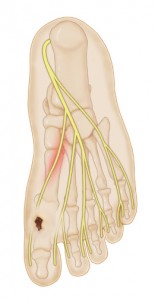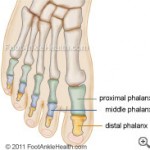Our nerves carry messages from our brain to all parts of our body. When a nerve is damaged, its ability to carry messages is affected and it is unable to perform its function. This is neuropathy.
There are several types of neuropathy. Peripheral neuropathy is a condition in which the peripheral nerves or the nerves in the extremities are damaged. This condition is a progressive disease that may come and go or may become severe and debilitating.
 The peripheral nervous system consists of motor nerves and sensory nerves. Motor nerves help you move, while sensory nerves help you feel. In neuropathy, either or both sets of nerves can be affected.
The peripheral nervous system consists of motor nerves and sensory nerves. Motor nerves help you move, while sensory nerves help you feel. In neuropathy, either or both sets of nerves can be affected.
In most cases, the patient who is suffering from neuropathy in the feet is diabetic. The exact reason for this is not known, but some possibilities are discussed below.
Of the several types of neuropathy, only a few relate to the feet. Besides peripheral neuropathy, additional common neuropathies include:
Diabetic sensory neuropathy: This form of neuropathy affects multiple nerves in the body, but mainly affects the feet, lower extremities, and sometimes the hands. It affects sensations, not movement, and is caused by poor control of diabetes over the course of several years. Burning, stinging pain can be felt in both feet.
Morton’s neuroma: Also known as interdigital neuropathy, this form of neuropathy affects the interdigital nerves of the feet, at the ball of the foot. It affects sensations, but doesn’t affect movement. Pain is often felt between the web spaces of the third and fourth toes when walking or standing.
Tarsal Tunnel Syndrome: This form of neuropathy affects the posterior tibial nerve, located on the inside of the ankle and the sole of the foot. It affects sensations, but doesn’t affect movement. The patient experiences pain under the foot, in the arch, and along the inside of the ankle, and this pain becomes worse when the patient walks. The pain is usually felt as a shooting sensation that may travel down into the foot or up the lower leg.
Additional types of neuropathies include:
- Autonomic neuropathy
- Cancer-related neuropathies
- Compressive neuropathies
- Drug-induced and toxic neuropathy
- G.I. and Nutrition-related neuropathies
- Hereditary neuropathies
- Immune-mediated and CIDP
- Infectious diseases and neuropathy
- Neuropathic pain
Neuropathy in Feet Symptoms To Watch For
People who suffer from neuropathy in the feet will have different symptoms, depending on which peripheral nerve has been damaged. If the sensory nerves are damaged, the symptoms will include:
- Tingling
- Burning sensation
- Numbness
- Tingling that spreads from ball of foot up to the leg
- Feeling like clothing is on bare skin
- Sensitive skin
- Pain
- Symptoms that are more severe at night
If the motor nerves are damaged, the symptoms will include:
- Weakness in the muscles of the affected limb or foot
- Paralysis
- Loss of sensation in feet
- Dizziness when standing (usually only seen in diabetics)
- Intestinal problems (usually only seen in diabetics)
- Drop in blood pressure (usually only seen in diabetics)
What Causes Neuropathy in the Feet?
Neuropathy in the feet is a very common condition. According to the Neuropathy Association, over 20 million Americans suffer from peripheral neuropathy, or neuropathy in the feet.
It can happen at any age, but it is more common among older adults. There are a number of causes for neuropathy occurring in the feet, including:
- Diabetes (the leading cause)
- Cancer/Chemotherapy
- Alcohol
- Genetics
- Trauma
- Deficiency of vitamins, especially vitamin B12
- Kidney failure
- AIDS
- Guillain-Barre Syndrome
- Exposure to radiation
- Tumors
- Medication
- Systemic lupus erythematosus
- Scleroderma
- Rheumatoid arthritis
It is estimated that 30 percent of neuropathy cases are idiopathic, or have an unknown cause. In another 30 percent of cases, diabetes is the cause.
The other 40 percent can be attributed to the causes listed above. Diabetes is by far the most common cause of neuropathy in feet, and it can lead to severe complications in the feet and legs.
Diabetic peripheral neuropathy happens when the nerve fibers in diabetic patients are damaged.
Many experts believe the damage occurs due to blood-glucose changes that affect the metabolism of nerve cells. Damaged and tingling sensory nerves, burning sensations, and numbness are common symptoms of diabetic peripheral neuropathy patients.
Diagnosing Neuropathy in Feet – What to Expect
If you believe you are suffering from the symptoms of neuropathy in your feet, you should seek medical attention from your primary care physician, a podiatrist, or a neurologist.
Your doctor will begin the exam with a series of questions about your habits, the symptoms you are experoencing, your work environment, your family medical history, and risks you may have for inherited disorders or conditions.
After that, you will be given a physical exam. Your doctor will evaluate your ability to register vibrations, light touch, temperature, and pain in order to check for any sensory nerve damage. Additional tests may include:
- Muscle strength tests
- Examination of your cerebrospinal fluid to check for abnormal antibodies associated with neuropathy
- Blood tests to check for systemic diseases like diabetes. Blood tests can also detect other potential causes such as vitamin deficiencies.
- CT scans
- MRI, or Magnetic Resonance Imaging tests, which can examine your muscles and detect damage to your nerves
- EMG, or electromyography, helps differentiate between muscle and nerve disorders.
- NCV, or nerve conduction velocity tests, measure the degree of damage in larger nerve fibers.
- Nerve biopsies are done to examine samples of nerve tissue.
Skin biopsies are used to examine nerve fiber endings through the skin.
How Your Neuropathy in Feet is Treated
It’s important to know that not all types of neuropathy can be cured. Many can be helped, and symptoms can be reduced, but curing the condition is not always possible.
Treatment is usually directed at the underlying cause. If the condition is due to a certain medication, the medication can be switched. If the condition is caused by a vitamin deficiency, vitamin supplements may help improve symptoms.
If the condition is caused by diabetes, treatment will include steps to control the diabetes. It’s very important that you seek the help of an experienced neurologist if you are experiencing symptoms of neuropathy.
You may want to check yourself regularly for cuts or bruises you may not have felt due to the loss of sensation. Pain killers, anti-depressants, and drugs used to treat seizures are also helpful in controlling symptoms of neuropathy in your feet.
How Can I Prevent Neuropathy in Feet?
It is possible to prevent neuropathy in your feet. Here are some tips to help you live a healthy lifestyle and prevent damage to the nerves in your feet:
- Call your doctor immediately to schedule an appointment if you or someone you know experiences symptoms of neuropathy.
- Eat plenty of whole grains, vegetables, fruits, and lean protein.
- Exercise regularly.
- Avoid excessive alcohol consumption.
- Be aware if you are sitting or standing in a cramped position; move around or shift often.
- Avoid repetitive motions; if possible, change your routines. For example, swim one day and run the next.
- Discuss new diets and exercise programs with your doctor first.
Drink plenty of fluids, especially when working out and during extreme hot or cold temperatures.
Talking to Your Doctor
Here are some questions you may want to ask your doctor about neuropathy in the feet:
- Are there any home remedies, such as foot soak mixtures, that may help relieve symptoms?
- What type of neuropathy do I have?
- How often should I check my feet for new cuts, bruises, etc?
- How long should I wait to contact you if new symptoms appear?
What type of diagnostic tests should I expect during my follow-up visit?
Resources for Neuropathy in Feet
The Neuropathy Association (NA) has several facilities located across the country. According to their web site, the following establishments are working closely with the NA to ensure that patients have access to the care and resources they need when living with neuropathy.
Be advised: before setting up an appointment at one of these locations, you will need a referral from your primary care physician. The Neuropathy Association’s web site is http://www.neuropathy.org/
Arizona
Banner Good Samaritan Neuropathy Center
1012 East Willetta St.
Phoenix, AZ 85006
Phone: 602-839-6305
California
Neuropathy Center at University of Southern California
Good Samaritan Hospital
637 South Lucas Avenue
Los Angeles, CA 90017
Phone: 213-975-9950
University of California at San Francisco Neuropathy Center
400 Parnassus Ave., 8th floor
San Francisco, CA 94143
Phone: 415-502-5064
Florida
University of Florida and Shands Jacksonville Neuropathy Center
580 West 8th Street
Plaza 1, 9th floor
Jacksonville, FL 32209
Phone: 904-244-3961
University of Miami Miller School of Medicine Neuropathy Center
Professional Arts Bldg. Room 609
Miami, FL 33136
Phone: 305-243-7400
Illinois
The Neuropathy Center at Edward Hines, Jr. VA Hospital
Neurology 127
5000 South Fifth Avenue
Hines, IL 60141
Phone: 708-202-2844
Kansas
The University of Kansas Neuropathy Center
3599 Rainbow Blvd
Mail Stop 2012
Kansas City, KS 66160
Phone: 913-588-0656
Louisiana
The Neuropathy Center of Excellence at Louisiana State University HSC
2820 Napoleon, Suite 700
New Orleans, LA 70115
Phone: 504-412-1517
Michigan
University of Michigan Neuropathy Center
Taubman Center 1914/0316
1500 East Medical Center Drive
Ann Arbor, MI 48109
Phone: 734-763-7274
Missouri
The Neuropathy Center at Saint Louis University
3660 Vista Avenue
St. Louis, MO 63110
Phone: 314-977-6082
New York
Peripheral Neuropathy Center at Columbia University
710 W. 168th St. Box 163
New York, NY 10032
Phone: 212-305-0405
Peripheral Neuropathy Center at Weill Medical College of Cornell University
1305 York Avenue, 2nd floor
New York, NY 10021
Phone: 646-962-3202
Ohio
The Neuropathy Center at Ohio State University
395 West 12th Avenue, 7th floor
Columbus, OH 43210
Phone: 614-293-4969
Tennessee
The Neuropathy Center of Excellence at Vanderbilt University Medical Center
2220 Pierce Avenue, PRB-B-1053
Nashville, TN 37232
Phone: 615-322-7246
Utah
The Peripheral Neuropathy Center at The University of Utah
30 North 1900 East, SOM 3R242
Salt Lake City, UT 84132
Phone: 801-585-6387




